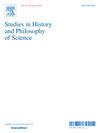Communal philosophy? A possible framework for academia-community interaction
IF 1.8
2区 哲学
Q1 HISTORY & PHILOSOPHY OF SCIENCE
引用次数: 0
Abstract
Interaction with local communities is commonly known as academia's "third mission," yet academia-community rifts are still common, running deeper in marginalized communities. A first step toward bridging the gap is clarification. We review core concepts (e.g., 'outreach,' 'accessibility,' 'engagement'), sort them into two model frameworks – "Ivory Tower" and "Reciprocal” or “Win-Win” – and describe their distinct structures. Both are helpful in relevant contexts. However, their default application hampers certain epistemic values, enacts unjust hierarchical boundaries, and indirectly ties diversity with personal alienation and ethnic divergence. Therefore, another model is suggested: “Communal Academia.” We unfold how this model foregrounds activism, heterogeneity, and pluralistic interaction. Imaginary and real-life examples demonstrate the practice-based advantages of this framework, and the philosophical relevance of a communal approach is reflected upon.
公共哲学?学术界与社区互动的可能框架
与当地社区的互动通常被称为学术界的“第三使命”,但学术界与社区的分歧仍然普遍存在,在边缘化社区中愈演愈深。缩小差距的第一步是澄清。我们回顾了核心概念(例如,“外联”、“可访问性”、“参与”),将它们分类为两个模型框架——“象牙塔”和“互惠”或“双赢”——并描述了它们不同的结构。两者在相关的语境中都是有用的。然而,它们的默认应用阻碍了某些认知价值,制定了不公正的等级界限,并间接地将多样性与个人异化和种族分歧联系在一起。因此,提出了另一种模式:“公共学术”。我们揭示了这种模式是如何强调行动主义、异质性和多元互动的。想象和现实生活中的例子证明了这种框架基于实践的优势,并且反映了公共方法的哲学相关性。
本文章由计算机程序翻译,如有差异,请以英文原文为准。
求助全文
约1分钟内获得全文
求助全文
来源期刊

Studies in History and Philosophy of Science
管理科学-科学史与科学哲学
CiteScore
2.50
自引率
10.00%
发文量
166
审稿时长
6.6 weeks
期刊介绍:
Studies in History and Philosophy of Science is devoted to the integrated study of the history, philosophy and sociology of the sciences. The editors encourage contributions both in the long-established areas of the history of the sciences and the philosophy of the sciences and in the topical areas of historiography of the sciences, the sciences in relation to gender, culture and society and the sciences in relation to arts. The Journal is international in scope and content and publishes papers from a wide range of countries and cultural traditions.
 求助内容:
求助内容: 应助结果提醒方式:
应助结果提醒方式:


